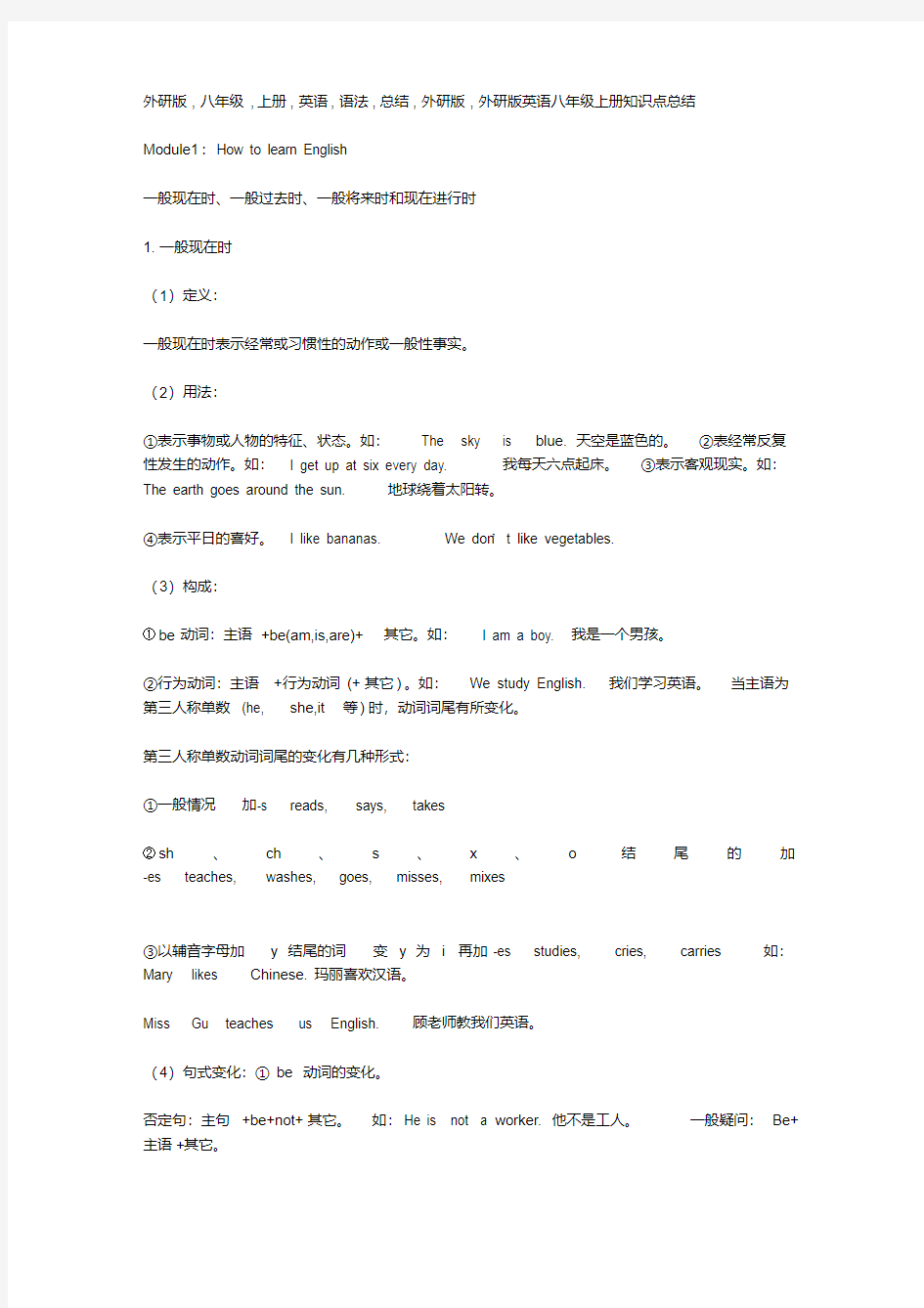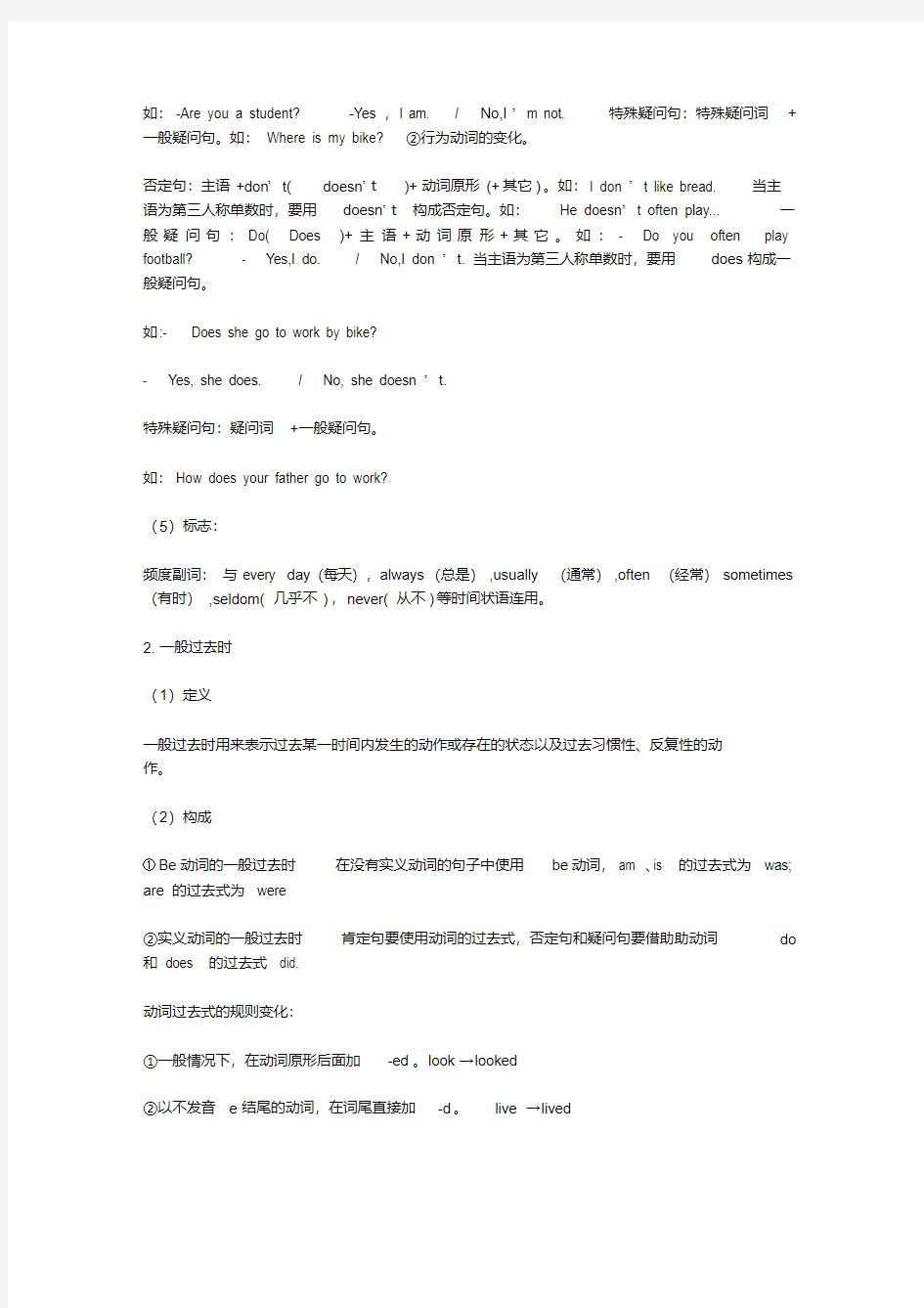外研版八年级上册英语语法总结.pdf


外研版,八年级,上册,英语,语法,总结,外研版,外研版英语八年级上册知识点总结
Module1:How to learn English
一般现在时、一般过去时、一般将来时和现在进行时
1.一般现在时
(1)定义:
一般现在时表示经常或习惯性的动作或一般性事实。
(2)用法:
①表示事物或人物的特征、状态。如:The sky is blue.天空是蓝色的。②表经常反复性发生的动作。如:I get up at six every day.我每天六点起床。③表示客观现实。如:The earth goes around the sun.地球绕着太阳转。
④表示平日的喜好。I like bananas. We don’t like vegetables.
(3)构成:
①be动词:主语+be(am,is,are)+其它。如:I am a boy.我是一个男孩。
②行为动词:主语+行为动词(+其它)。如:We study English.我们学习英语。当主语为第三人称单数(he, she,it等)时,动词词尾有所变化。
第三人称单数动词词尾的变化有几种形式:
①一般情况加-s reads, says, takes
②sh、ch、s、x、o结尾的加-es teaches, washes, goes, misses, mixes
③以辅音字母加y结尾的词变y为i再加-es studies, cries, carries 如:Mary likes Chinese.玛丽喜欢汉语。
Miss Gu teaches us English. 顾老师教我们英语。
(4)句式变化:①be动词的变化。
否定句:主句+be+not+其它。如:He is not a worker.他不是工人。一般疑问:Be+主语+其它。
如:-Are you a student? -Yes,I am. / No,I’m not. 特殊疑问句:特殊疑问词+一般疑问句。如:Where is my bike? ②行为动词的变化。
否定句:主语+don’t(doesn’t)+动词原形(+其它)。如:I don’t like bread. 当主语为第三人称单数时,要用doesn’t构成否定句。如:He doesn’t often play...一般疑问句:Do( Does )+主语+动词原形+其它。如:- Do you often play football? - Yes,I do. / No,I don’t.当主语为第三人称单数时,要用does构成一般疑问句。
如:- Does she go to work by bike?
- Yes, she does. / No, she doesn’t.
特殊疑问句:疑问词+一般疑问句。
如:How does your father go to work?
(5)标志:
频度副词:与every day(每天),always(总是),usually(通常),often(经常)sometimes (有时),seldom(几乎不),never(从不)等时间状语连用。
2.一般过去时
(1)定义
一般过去时用来表示过去某一时间内发生的动作或存在的状态以及过去习惯性、反复性的动
作。
(2)构成
①Be动词的一般过去时在没有实义动词的句子中使用be动词, am 、is 的过去式为was; are的过去式为were
②实义动词的一般过去时肯定句要使用动词的过去式,否定句和疑问句要借助助动词do 和 does 的过去式 did.
动词过去式的规则变化:
①一般情况下,在动词原形后面加-ed。look→looked
②以不发音e结尾的动词,在词尾直接加-d。live→lived
③以“辅音字母+ y”结尾的动词,先将y 改为i ,再加–ed。study→studied try→tried fly→flied
⑤以重读闭音节(即辅音+元音+辅音)结尾,末尾只有一个辅音字母的动词,要先双写这
个辅音字母后,再加–ed。stop→stopped plan→planned prefer→preferred
不规则动词的过去式需特殊记忆。
(3)句式变化
①be动词的变化
肯定句:主语 + be(was , were) + 其它.
否定句:主语 + be(was , were) + not + 其它. (wasn’t/weren’t)
一般疑问句:Be(was , were) + 主语 + 其它?
特殊疑问句:特殊疑问词+ be(was,were) + 主语 + 其它
②行为动词的变化
肯定句:主语 + 动词(过去式)+ 其它
否定句:主语+didn’t +动词(原形)+其它【did not = didn’t】
一般疑问句:Did + 主语+ 动词(原形)+ 其它【do , does的过去时均为did】?
特殊疑问句:特殊疑问词+did+主语+动词原形+其它
(4)判断方法
①标志
yesterday , the day before yesterday (前天), last + 时间 , 时间 + ago , just now ,
in 1990(在1990年),at the age of,When i was 8...,this morning ,that day , in those days 等。
②根据语境和语义判断
Eg:She went to the cinema once a month when she was in Beijing.
She got up early, fetched water, cleaned the room and then went out for a walk. 她早早起床,提水,打扫房间然后出去散步。
3.一般将来时
(1)定义:
表示将来某一时刻的动作或状态或将来某段时间内经常的动作或状态
(2)构成:
①will(will可用于所有人称,shall只用于第一人称I和we)+动词原形
②be going to+动词原形
(3)句式变化:
①will do:
肯定句:主 + will do
否定句:主+ won’t do
一般疑问句:will + 主 + do
特殊疑问句:what/when/where/which + will + 主 + do
②be going to do:
肯定句:主 + be going to + do
否定句:主+be not going to + do
一般疑问句:be + 主 + going to + do
特殊疑问句:what/when等 + be +主+ going to + do
(4)标志词:
tomorrow, the day after tomorrow, next week/month/ye ar…, in two years,in the future, soon, from now on, this evening/year…, three days later 等吗
(5)用现在进行时be doing表示将来时:go, come, leave, arrive,fly等表示位置转移的动词
如: Uncle Wang is coming王叔叔就要来了。
4.现在进行时
(1)定义:现在进行时表示现在正在进行或发生的动作,也可表示当前一段时间内的活动或
现阶段正在进行的动作。
(2)构成:am/is/ are+ v-ing
动词加ing的变化规则:
①一般情况下,直接加ing,如:cook-cooking
②以不发音的e结尾,去e加ing,如:make-making, taste-tasting
③如果末尾是一个元音字母和一个辅音字母,双写末尾的辅音字母,再加ing,如:run-running, stop-stopping sit-sitting get-getting forget-forgetting begin-beginning
④以ie结尾的动词,改ie为y加ing ,如:die--dying死亡lie--lying
躺 tie--tying系
(3)句式变化:
1.否定句:主语+ be not+doing+其它
2. 一般疑问句:把be动词提前:Be+主语+doing+其它
3. 特殊疑问句:特殊疑问词+be+主语+doing Eg.:what are you doing?
(4)标志
①表示说话时正在进行的动作常和now,right now连用,有时用一个动词如look(看)、listen (听)来表示(现在)这一时间概念。如:Look!A train is coming. Listen!He is playing the piano.
②表示现阶段正在进行着的动作但不一定是说话时正在进行。常和at present(目前)、this week(本周)、these days(这几天)等时间状语连用。What lesson are you studying this week?(说话时并不在学)
③现在进行时有时可用来表示一个在最近按计划或安排要进行的动作即是说可以用来代替将
来时,但此时,一般要与表示将来的时间状语连用,而且仅限于少量动词。如:go(去)、come (来)、leave(离开)、arrive(到达)、return(返回)、sleep(睡觉)…Are you going to Tianjing tomorrow?How many of you are Coming to the party next week?④be going to+动词原形这一句型表示即将发生的事或打算(准备)做的事,我们把它归在将来时里了。
she isn't going to speak at the meeting.注意:如果没有表示将来时间的状语,此类句子就可能指现在或现阶段的动作。Where are you going next week?用现在进行时表示将来时,因为有next week这一时间状语。Where are you going?
大学英语语法大全_太经典了
大学英语语法 学习提纲 一、词类、句子成分和构词法: 1、词类:英语词类分十种: 名词、形容词、代词、数词、冠词、动词、副词、介词、连词、感叹词。 1、名词(n.):表示人、事物、地点或抽象概念的名称。如:boy, morning, bag, ball, class, orange. 2、代词(pron.):主要用来代替名词。如:who, she, you, it . 3、形容词(adj..):表示人或事物的性质或特征。如:good, right, white, orange . 4、数词(num.):表示数目或事物的顺序。如:one, two, three, first, second, third, fourth. 5、动词(v.):表示动作或状态。如:am, is,are,have,see . 6、副词(adv.):修饰动词、形容词或其他副词,说明时间、地点、程度等。如:now, very, here, often, quietly, slowly. 7、冠词(art..):用在名词前,帮助说明名词。如:a, an, the. 8、介词(prep.):表示它后面的名词或代词与其他句子成分的关系。如in, on, from, above, behind. 9、连词(conj.):用来连接词、短语或句子。如and, but, before . 10、感叹词(interj..)表示喜、怒、哀、乐等感情。如:oh, well, hi, hello. 2、句子成分:英语句子成分分为七种:主语、谓语、宾语、定语、状语、表语、宾语补足语。 1、主语是句子所要说的人或事物,回答是“谁”或者“什么”。通常用名词或代词担任。如: I’m Miss Green.(我是格林小姐) 2、谓语动词说明主语的动作或状态,回答“做(什么)”。主要由动词担任。如:Jack cleans the room every day. (杰克每天打扫房间) 3、表语在系动词之后,说明主语的身份或特征,回答是“什么”或者“怎么样”。通常由名词、 代词或形容词担任。如:My name is Ping ping .(我的名字叫萍萍) 4、宾语表示及物动词的对象或结果,回答做的是“什么”。通常由名词或代词担任。如: He can spell the word.(他能拼这个词) 有些及物动词带有两个宾语,一个指物,一个指人。指物的叫直接宾语,指人的叫间 接宾语。间接宾语一般放在直接宾语的前面。如:He wrote me a letter . (他给 我写了一封信) 有时可把介词to或for加在间接宾语前构成短语,放在直接宾语后面,来强调间接宾 语。如:He wrote a letter to me . (他给我写了一封信) 5、定语修饰名词或代词,通常由形容词、代词、数词等担任。如: Shanghai is a big city .(上海是个大城市)
大学英语语法大全
大学英语语法 (CET--4) 学习提纲 一、词类、句子成分和构词法: 1、词类:英语词类分十种: 名词、形容词、代词、数词、冠词、动词、副词、介词、连词、感叹词。 1、名词(n.):表示人、事物、地点或抽象概念的名称。如:boy, morning, bag, ball, class, orange. 2、代词(pron.):主要用来代替名词。如:who, she, you, it . 3、形容词(adj..):表示人或事物的性质或特征。如:good, right, white, orange . 4、数词(num.):表示数目或事物的顺序。如:one, two, three, first, second, third, fourth. 5、动词(v.):表示动作或状态。如:am, is,are,have,see . 6、副词(adv.):修饰动词、形容词或其他副词,说明时间、地点、程度等。如:now, very, here, often, quietly, slowly. 7、冠词(art..):用在名词前,帮助说明名词。如:a, an, the. 8、介词(prep.):表示它后面的名词或代词与其他句子成分的关系。如in, on, from, above, behind. 9、连词(conj.):用来连接词、短语或句子。如and, but, before . 10、感叹词(interj..)表示喜、怒、哀、乐等感情。如:oh, well, hi, hello. 2、句子成分:英语句子成分分为七种:主语、谓语、宾语、定语、状语、表语、宾语补足语。 1、主语是句子所要说的人或事物,回答是“谁”或者“什么”。通常用名词或代词担任。 如:I’m Miss Green.(我是格林小姐) 2、谓语动词说明主语的动作或状态,回答“做(什么)”。主要由动词担任。如:Jack cleans the room every day. (杰克每天打扫房间) 3、表语在系动词之后,说明主语的身份或特征,回答是“什么”或者“怎么样”。通常由名 词、代词或形容词担任。如:My name is Ping ping .(我的名字叫萍萍) 4、宾语表示及物动词的对象或结果,回答做的是“什么”。通常由名词或代词担任。如: He can spell the word.(他能拼这个词) 有些及物动词带有两个宾语,一个指物,一个指人。指物的叫直接宾语,指人的叫间接 宾语。间接宾语一般放在直接宾语的前面。如:He wrote me a letter . (他给我写了 一封信) 有时可把介词to或for加在间接宾语前构成短语,放在直接宾语后面,来强调间接宾 语。如:He wrote a letter to me . (他给我写了一封信) 5、定语修饰名词或代词,通常由形容词、代词、数词等担任。如: Shanghai is a big city .(上海是个大城市) 6、状语用来修饰动词、形容词、副词,通常由副词担任。如:He works hard .(他工作努力) 7、宾语补足语用来说明宾语怎么样或干什么,通常由形容词或动词充当。如:They usually keep their classroom clean.(他们通常让教室保持清洁)/ He often helps me do my lessons.(他常常帮我做功课)/ The teacher wanted me to learn French all by myself.(老师要我自学法语) ☆同位语通常紧跟在名词、代词后面,进一步说明它的情况。如:Where is your classmate Tom ?(你的同学汤姆在哪里?)
最新英语自考本科-英语语法-名词解释
1.Predicative modal auxility The Predicative modal auxility is a category of modal auxiliary. The predictive meaning, rather homogeneous in nature, is concerned with the speaker’s assuption or assessment o f probability and, in most cases, indicates the speaker’s confidence in the truth of his statement. For example, might, may, could,can. 2.Anaphoric refernce Anaphoric refernce: refernce backwards in the text. A personal pronoun, for example, often has anaphoric reference, i.e. you have to look at the preceding context to see what it refers to. For example, ann was studying for her exams. She found it difficult to concentrate. In this example, she has anaphoric reference. 3. Non-finite verbs: The non-finite verbs are so called because they are not marked for ttense of for subject-verb concord. We recognite three types of non-finite verbs: infinitive, -ing participle and –ed participle. 4. Extraposition The extraposition is defined as the replacement of the postponed item by a substitute form. 5. Text The term text refers to a unified passage. A text may be spoken or written, prose or verse, dialogue or monologue. It may be anything from a single proverb to a whole play, from a momentary cry for help to all-day discussion on a committee. 6. participles Participles belong to non-finite verb type. There are two kinds of participles: -ing participle and –ed participle. 7. What is dangling participle? When the subject of a participle is not expressed, it is normally understood to be the subject of the main clause. We call this kind of participle dangling participle. 8. What is “fronting”? “fronting”is a term which refers to the removal of an item from its unmarked post-subject position to the marked pre-subject position. As fronting moves into the initial position an item which does not usually belong there, such a grammatical device disturbs the expected route of information flow and inevitable brings about unusualness, i.e. “this man over there people in the vicinity have a very low opinion of.” 9. Define “ellipsis” The basic principle of ellipsis is leaving out something understood and hence produces imcomplete sentences with such a structure as to presuppose a preceding item. Ellipsis, somehow like substitutions, sets up cohesion on the basis of structural recoverability with reference to the linguistic context. Here are three types of ellipsis: nominal: why give me two cups of coffee? I only asked for one. a.Verbal:A: have you seen him before? B: yes, I have. b.clausal: A: will it rain tomorrow? B: perhaps. 10. Determiners Determiners refer to words which are used in the premodification of a noun phrase and which typically precede any adjectives that premodify the head word.
小学到大学英语语法大全
小学到大学英语级语法大全 小学英语语法大全 (2) 初中英语语法大全 (19) 高中英语语法大全 (29) 大学英语语法大全 (44)
小学英语语法大全 第一章名词 一、定义 名词是表示人或事物名称的词。它既可以表示具体的东西,也可以是表示抽象的东西。 二、分类 1. 名词可以根据意义分为普通名词和专有名词 如:john is a student student是普通名词,john是专有名词 普通名词前可以用不定冠词a/an, 定冠词the 或不加冠词,专有名词前一般不加冠词,专有名词的首字母要大写。 2. 普通名词又可以分为个体名词、集体名词、物质名词和抽象名词,其中个体名词与集体名词是可数名词,物质名词和抽象名称是不可数名词。 3. 专有名词 专有名词是表示人名、地名、团体、机构、组织等的专有名词,多为独一无二的事物。 三、名词的数 1、名词分为可数名词和不可数名词。 可数名词——可以数的名词 不可数名词——数不清(没有复数) drink?milk tea water orange juice coke coffee porridge food?rice bread meat fish fruit cake dumplings 2、可数名词与不定冠词a(an)连用有数数形式,不可数名词不能与不定冠词a(an)连用,没有复数形式 many+可数名词复数 much/a little+不可数名词 some, any , a lot of (lots of) 两者都可以修饰。 3、可数名词可以直接用数词来修饰 不可数名词数词 +量词 +of + 名词 对可数名词的数量提问用how many 对不可数名词的数量提问用 how much 4、不可数名词的量有以下两种表示方法:
大学英语语法名词总结grammar terms
Grammar terms 1.Inflectional Affix 屈折词缀example:-es,-s,-ed,-d,-er,-est 2.Derivational Affix派生词缀example:prefix:anti-,co-,un-;suffix:-ion,-ness 3.Derivative派生词example:unfair,nonsmoker https://www.360docs.net/doc/5f3599933.html,pound word复合词 n. + n. workshop, bookshelf, lifesaver, color-film pron. + n. she-wolf, he-bear, he-man n. + v. sunrise, sunset, shoplift, power-cut v. + n. scarecrow, telltale, breakfast, turncoat a. + n. greenhouse, red-tape, bluebook a. +n. + ed. smooth-tongued, cold-blooded, narrow-minded, high-nosed n. + v. + ed. heart-broken, weather-beaten, home-made, heartfelt n. + v. + ing. peace-keeping, law-abiding, time-saving, truth-telling, fact-finding n. + a. blood-thirsty, ice-free, snow-white, homesick a. + n. high-grade, first-class, long-range, new-type, second-hand a. + a. bloody-red, bittersweet, dead-alive, white-hot v. + a. test-wise, failsafe, diehard, talk-big prep. + n. indoor, overhead, aboveboard, online hyphen conj. out-of-door, life-and-death, wait-and-see adv. + v. to overtake, to uplift, to uproot, to underline, to downplay, to upload n. + n. to brainstorm, to streamline, to dog-ear, to windsurf, to showcase n. + v. to air-drop, to eavesdrop, to breastfeed, to nose-dive, to mastermind a. + v. to safeguard, to whitewash, to blindfold 5.Closed class封闭词类介词preposition in,of,on,without 代词pronoun you,he,one,which 限定词Determiner a,the,this,some 连词conjunction and,or,but,because 助动词Auxiliary do,can,may,must,will Determiner限定词definite article,indefinite article,zero article, a,the,/ possessive determiner物主限定词my,your,his genitive noun名词属格John’s,Bob’s demonstrative determiner 指示限定词this,that Relative determiner 关系限定词whose,which Interrogative determiner 疑问限定词what,whose,which Indefinite determiner不定限定词no,some,any,every Cardinal numeral基数词&ordinal numeral序数词 Multiplicative numeral倍数词& fractional分数词 Quantifier量词 a lot of,a great number of 6.Open class 开放词类noun,adjective,adverb,main verb 7.介于封闭与开放cardinal numbers基数词,ordinal numeral序数词;interjection 感叹词
大学英语语法汇总
大学英语语法汇总 一、名词 (一)以S结尾得名词做主语得主谓一致 1、以s结尾得疾病与游戏 arthritis,bronchitis,rickets,measles,mumps,diabetes,darts,marbles做主语时谓语动词应使用单数形式。例:Arthritis causes pain in the joints、特殊情况:有一些疾病/游戏名词作谓语动词可单可复:measles,rickets Cards做主语动词用复数;darts,marbles指游戏使用得具体得镖与弹子意义时,谓语动词marbles可单可复,darts用复数形式。 例:Measles always cccur/occurs among kids、 Nine darts are thrown at each turn、 2、以s结尾得学科名称 physics,mathematics,optics,acoustics,politics,athletics,tactics,lingu istics,etc做主语时谓语动词使用单数。 例:Mathematics is always a headache for girls、 Politics always attracts boys、 特殊情况:如果这些词并不就是只带“学科”等意义,谓语动词便可做复数使用。例如,mathematics运算能力,athletic体育运动,acoustics音响效果,tactics 策略,economics经济学意义。 例:The acoustics in Bon Jovi’s Tulsa concert were beyond criticism last spring、 3、以s结尾得地理名称 The States,the united states,the Netherlands,the Philippines,the United Arab Emirates,the United Nation做主语时,谓语动词使用单数。 例:The Netherlands is a Euroupean country、The Sates is a developed country 特殊情况:如果主语就是群岛archipelago,山脉mountains,海峡straits,瀑布waterfalls,运动会games等,谓语动词则使用复数。 例:The Nansha Islands (The Spratly Islands)are integral part of China、The Wuyi mountains are picturesque、 The Olympic Games are held every four years、 4、其她以S结尾得名词 (1)成双成对出现得名词做主语时:例如jeans,compasses(圆规) scissors,pincers,glasses,pants,shorts,trousers,slacks,suspenders等谓语动词使用复数、 例:The slacks are so completeful、The Hengdali glasses are so pricey、但就是加上单位词则使用单数。 例:One pair of glasses is far from enough when you travel abroad、(2)英语中还有一些以s结尾得名词,如 archives,arms,clothes,contents,eaves,fireworks,firecrackers,goods,mor als,thanks等,谓语动词使用复数。 例:The firecrackers are so loud、Many thanks go to my wife and her floks、(3)Ings结尾得名词谓语动词一般使用复数。如, clippings,diggings,earnings,fillings,sweepings,etc
大学英语常用经典词组教学提纲
大学英语常用经典词 组
at large(=at liberty, free)在逃,逍遥法外 at large(=in general)一般来说,大体上 at large(=at full length; with details)详细地 accuse…of…(=charge…with; blame sb. for sth. ; blame sth. on sb. ; complain about)指控,控告 allow for (=take into consideration, take into account)考虑到,估计到。 amount to (=to be equal to)总计,等于。 answer for (undertake responsibility for, be liable for, take charge for)对…负责。 abide by(=be faithful to ; obey)忠于;遵守 comply with (=act in accordance with a demand, order, rule etc.)遵守,依从 apply to sb. for sth. 为…向…申请 ; apply for申请; apply to 适用。 apply to 与…有关;适用 arise from(=be caused by)由…引起。 arrive on 到达; arrive at 到达某地(小地方);得出,作出; arrive in 到达某地(大地方);
be ashamed of (=feel shame, guilt or sorrow because of sth. done)以… 为羞耻 assure sb. of sth. (=try to cause to believe or trust in sth.)向…保证,使…确信。 attach(to)(=to fix, fasten; join)缚,系,结 attend to (=give one’s attention, care and thought)注意,照 顾;attend on(upon)(=wait upon, serve, look after)侍候,照料 in accordance with (=in agreement with)依照,根据 on one’s o wn account 1)为了某人的缘故,为了某人自己的利益 2) (=at one’s own risk)自行负责 3)(=by oneself)依靠自己 on account赊账; on account of 因为; on no account不论什么原因也 不;of …account有…。.重要性。 take…into account(=consider)把。..考虑进去 account for (=give an explanation or reason for)解释,说明。 on account of (=because of)由于,因为。来源: be accustomed to (=be in the habit of, be used to)习惯于。 be acquainted with(=to have knowledge of)了解; (=to have met socially )熟悉
